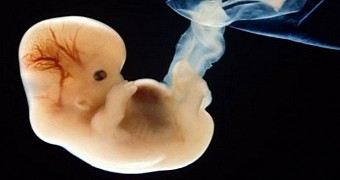Just a few years ago, the idea of genetically engineered humans was confined to the realm of science fiction. These days, however, it is encroaching on reality.
Soon enough, the issue of designer babies will no longer be about whether or not it can be done. It will be about whether we should.
In fact, there’s already talk - heated debate, actually - about the perks and the risks of using genetics to give the human species a nudge up the evolution scale.
We already have proof of concept
Towards the end of last month, a team of scientists in China announced their success in modifying the genetic makeup of several laboratory-made human embryos.
The embryos, provided by local fertility clinics, had a gene called HBB edited. This gene was chosen for editing because, when in a mutated form, it can trigger a fatal blood disorder.
What this means is that, once left without the potentially deadly gene, the embryos were no longer vulnerable to the blood disorder caused by it.
Well, the persons who might have formed from the embryos would not have had to worry about developing the condition resulting from mutations in this gene, to be more precise.
Admittedly, the human embryos used in these experiments were not viable to begin with and weren’t allowed to develop past a certain point.
However, this does not change the fact that these experiments are proof of concept when it comes to the idea of using genetic engineering to create a new class of people.
The perks of engineering humans in the lab
There is great potential with genetic engineering, there is no denying it. For starters, parents could make sure that their future children do not carry genes that might make them vulnerable to cancer, Huntington’s or other diseases known to be influenced by genetics.
Besides, having designer babies become a reality means couples could pick and choose the traits they would like their kids to display. Kind of like settling on the perfect toppings for the perfect pizza.
Some might want a baby girl with blue eyes. Others might want a brown-eyed boy. With genetic engineering, they could all get what they want. To many, knowing beforehand what they’ll get the day they welcome a child in their life would be a dream come true.
There are also cons, make no mistake about it
The thing about nature is that, although it may not seem like it, it doesn’t do anything at random. Throw in genetic engineering, and you’re basically toying with it and its eons-old ways.
In some cultures, having a boy is preferable to having a girl. Should genetic engineering make it possible for parents to choose the gender of their future children, those cultures would wake up one day to a seriously imbalanced population.
In much the same way, there is the argument that genetic engineering would eliminate individuality, as couples would undoubtedly choose to endow their offspring with the most desired of traits.
We’d all be handsome and we’d all be smart. It all sounds very promising, but we’re basically talking about doing away with diversity, and since we’d all be best version of ourselves, crossing one of nature’s most basic principles: survival of the fittest.
Of course, this would only happen if we could all afford to engineer our babies. Otherwise, society would be split into the rich and their perfect, lab-made babies and the not-so-rich and their old school families.
Ultimately, the choice will be ours
Admittedly, it is only a matter of time until science provides us with the tools to get the babies we want. No more crossing our fingers and hoping for the best.
Still, the fact remains that we’ll still have a say in the matter. Throw in some common sense and we might actually make these new opportunities work to our advantage.
Bottom line, here’s what I think: let’s embrace genetic engineering and let it solve the problems that do in fact need solving - I’m talking about the diseases we would be better off without - but also make sure we keep it on a tight leash and not let it level us as a species.

 14 DAY TRIAL //
14 DAY TRIAL //